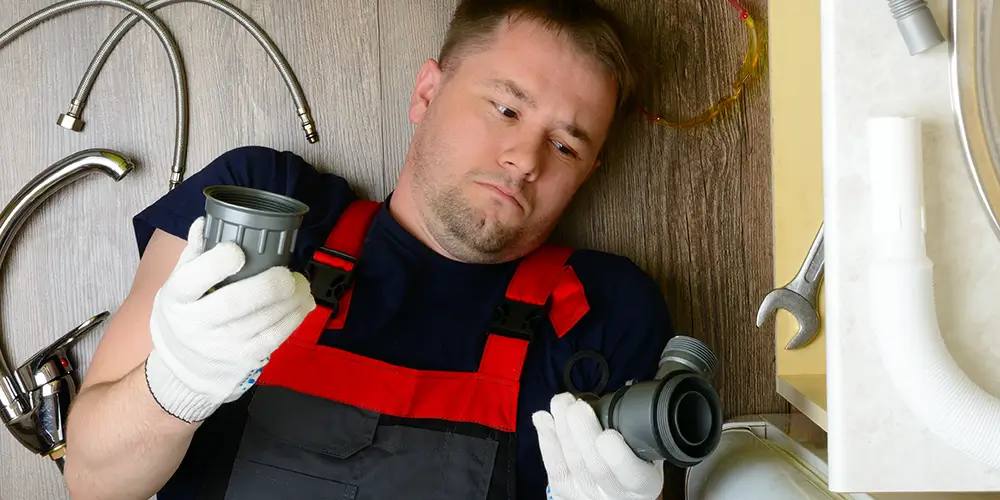There are smart DIYers, and others who are — well, we won’t say it.
The smart ones know their limitations.
DIY plumbing repairs done right can save you a wheelbarrow of money. DIY repairs done wrong can lead to a costly emergency visit from the plumber. Worse, they can devalue your home and cause major problems down the road.
Before you pick up that wrench, be sure you aren’t committing the DIY plumbing blunders we list below, and call a professional if you have any lingering doubts about your DIY abilities.
1. Not Turning Off the Water
Most fixtures have localized shutoffs, but those shutoffs sometimes fail.
Even if you’re turning off the water at the fixture, you should also turn off the water main, or at least know how to do so in case something goes wrong. You’ll find the main shutoff valve near your water meter, usually in a basement or crawlspace.
This is a crucial step to prevent water damage and potential flooding. Before attempting DIY plumbing projects, locate and familiarize yourself with the main shutoff valve.
2. Using Incorrect Tools
Just because you have a wrench and pliers doesn’t mean you’re ready to tackle any plumbing project. Using the wrong tools can cause tremendous damage to your pipes and fixtures.
For example, using standard pliers instead of a pipe wrench can round off the edges of a nut or bolt, making removing it nearly impossible. Using a plumber’s snake without proper training and knowledge can degrade pipes or scratch a toilet’s porcelain.
Before you start your DIY plumbing project, verify that you have the correct tools for the job.
3. Forgetting to Wear Protective Gear
Some plumbing repairs involve harsh chemicals and materials. Neglecting to wear protective gear can lead to burns, cuts, and even severe respiratory issues.
Always wear gloves, safety glasses, and any other necessary protective gear when handling chemicals or working with potentially hazardous materials.
4. Over-Tightening Connections
The tighter, the better! Not necessarily.
Over-tightening fittings and connections can damage pipes, leading to leaks or burst pipes in the future.
Use a wrench or pliers to tighten connections just enough to create a secure seal without compromising pipes or stripping connections.
5. Using Too Much Drain Cleaner
Frustration may tempt you to pour an entire bottle of drain cleaner down the drain. Don’t do it! Pull yourself together!
Drain cleaners are highly corrosive and can eat away at metal and plastic pipes, joints, and fixtures.
Moreover, frequent back-ups or slow drains may be a sign of a much larger problem. If your clog is persistent, call the professionals. They have better tools and the expertise to clear everything from toys to tree roots.
6. Doing Unpermitted Work
Local building codes include rules and regulations for plumbing. These codes cover everything from types of materials to pipe placements. The codes are there to protect your home from shoddy or unsafe work.
Failing to follow the codes can result in fines, violations, and even property devaluation. Unpermitted work can be a major headache when it’s time to sell your home.
Always obtain necessary permits and ensure that any DIY plumbing work is up to code. You won’t violate codes by unclogging a toilet or replacing a faucet, but anything beyond minor repairs may require a permit.
7. Mismatching Pipes & Fittings
Some DIYers get a little too creative when they don’t have the right size or type of pipe. Mismatching pipes and fittings is usually a no-no.
Some plastics and metals don’t play well with others. For example, copper connectors attached to galvanized pipes can corrode.
Stick to the same material and pipe size for your repairs. Call a professional plumber if you encounter an issue requiring a different size or type of pipe.
8. Lack of Maintenance
“Out of sight, out of mind” never works with plumbing. Small leaks and drips can quickly escalate into serious water and mold damage.
Regularly inspect your plumbing fixtures, such as faucets, toilets, and pipes, for signs of wear or damage. Address any issues immediately to prevent costly repairs in the future.
9. Skipping Professional Inspections
Even if you’re the world’s best DIYer, you should schedule regular professional plumbing system inspections. An experienced plumber can catch potential problems early.
The pros can also offer valuable advice on maintenance and repairs that will save you money in the long run. No matter how confident you are in your DIY skills, don’t skip these inspections.
10. Not Knowing Your Limits
The biggest mistake you can make is taking on a job beyond your skill level. Simple fixes, like replacing a faucet or cleaning out a P-trap, are great for beginners and can build your confidence.
However, larger plumbing projects demand specialized skills and training. Poorly executed repairs can damage your home, lower its value, or violate building codes.
When in doubt, call the pros. A failed DIY job can cost far more than hiring a plumber from the start.
11. Band-Aid Repairs
Don’t slap on duct tape if a pipe springs a leak. Temporary fixes may work for a moment, but they won’t solve the problem.
Take time to understand the problem and plan appropriately. Making Band-Aid repairs without addressing the root cause can lead to repeated issues and costly repairs in the future.
A DIY plumbing project may seem like an easy way to save money, but you’ll quickly change your tune if you wake up in the night to a flood. Protect your home and family by tackling only what you can handle.
FAQs: DIY Plumbing Mistakes
Q: Can DIY plumbing mistakes devalue my home?
Poor DIY plumbing repairs or installations can lead to costly problems. If the work isn’t up to code or causes larger issues, it may also decrease the value of your home.
Q: Can I use drain cleaner as a quick fix?
Drain cleaner should be used sparingly and only according to the label instructions. Overuse of drain cleaner can damage pipes and cause more expensive problems.
Q: How do I know if I’m in over my head with a plumbing project?
If you’re unsure about your skills or knowledge, consult a professional. Attempting a project beyond your abilities can lead to costly mistakes and potentially unsafe conditions.
Q: How do I find my main water shutoff valve?
The main water shutoff valve is typically located near where the water line enters your home. It can be in the basement, crawlspace, utility room, or an exterior wall.
Q: Can mismatched pipes cause leaks?
Connecting incompatible materials, such as copper, to galvanized steel without the proper fittings can cause corrosion and lead to leaks over time. Always research or consult a professional before combining different types of pipes.
Q: Why is it essential to follow building codes for plumbing?
Building codes ensure the safety and functionality of your plumbing system. Ignoring them can result in leaks, water damage, and even legal issues. Also, unpermitted work can deter potential buyers if you sell your home.
Q: What tools should I have for basic plumbing repairs?
You should have a pipe wrench, adjustable wrench, plunger, plumber’s tape, a bucket, and screwdrivers. A drain snake or auger can also help clear clogs.
Q: What should I do if I accidentally cause a water leak?
Immediately shut off the water supply at the main valve to minimize damage. Assess the damage and determine if it’s within your ability to repair. If not, call a licensed plumber for assistance.


